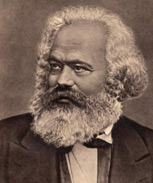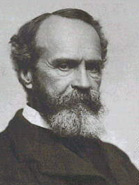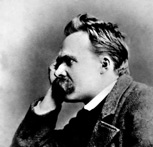Philosophers & Representative Quotes - Page 3/3
 Søren Kierkegaard (1813-1855, Denmark, Copenhagen) »
Søren Kierkegaard (1813-1855, Denmark, Copenhagen) » All logical thinking employs the language of abstraction. It is easier to indulge in abstract thought than it is to exist.
Danish philosopher and theologian. Considered the father of Existentialism, a branch of philosophy that focuses on solving the problems associated with man's existence here-n-now by addresing how one achieves and what constitutes a Fulfilling Life.- Much of his work deals with religious themes such as faith in God. He leaves the task of discovering the meaning of his works to the reader, because "the task must be made difficult, for only the difficult inspires the noble-hearted."
His mother had served as a maid in the household before marrying Søren's father. His father was melancholic, anxious, deeply pious, and fiercely intelligent. The two had a close relationship.  Karl Marx (1818-1883, Germany) »
Karl Marx (1818-1883, Germany) » The philosophers have only interpreted the world in various ways; the point is to change it.
Marx tried to earn a living as a journalist, but his participation in unpopular political movements made it difficult to support his growing family. He finally settled in London, where he lived in poverty while studying and developing his economic and political theories.
Marx argued that the conditions of modern industrial societies tend to alienate workers from their own labor. Above all, he believed that philosophy should be employed to change the world. With Friedrich Engels, he wrote the Communist Manifesto. William James (1842-1910, USA, New York City) »
William James (1842-1910, USA, New York City) » Truth is made, just as health, wealth & strength are made, in the course of experience.
American psychologist and philosopher trained as a medical doctor. Came from a wealthy family. His godfather was Ralph Waldo Emerson. Despite an energetic constitution, James struggled with bouts of hypochondria, melancholy, and depression such that he would contemplate suicide for months on end. He studied mysticism and wrote a book titled The Varieties of Religious Experience. Friedrich Nietzsche (1844-1900, Germany) »
Friedrich Nietzsche (1844-1900, Germany) » The irrationality of a thing is no argument against its existence, rather a condition of it.
Born the son of a Lutheran pastor, Nietzsche was raised by female relatives beginning at age 5 after his father's death. He was the youngest ever (age 24) to be appointed to the Chair of Classical Philology at the University of Basel.
Nietzsche viewed tragedy as an affirmation of life and later produced the anti-religious works for which he's best known. He decried the 'slave morality' enforced by religious guilt. Only rare, superior individuals—which he termed Übermenschen—can rise above moral distinctions to live a nobel life. Exhibited symptoms of insanity in his final years. Ludwig Wittgenstein (1889-1951, Austria, Vienna) »
Ludwig Wittgenstein (1889-1951, Austria, Vienna) » What we cannot speak about we must pass over in silence.
Considered by many to be the greatest philosopher of the 20th century. Studied engineering before becoming interested in Philosophy at Cambridge. He gave away his inherited fortune and worked as a village schoolteacher in Austria. Youngest of 8 children. His father, a steel tycoon, was one of the richest men in the world.
His family had a history of self-criticism, to the point of depression and suicidal tendencies. Three of his four brothers committed suicide. Ludwig attended the same school as Hitler, who was born a mere 6 days before him. At the school, Wittgenstein spoke with a slight stutter, wore elegant clothes, and was highly sensitive and extremely unsociable. Good video » here (4 mins). Martin Heidegger (1889-1976, Germany) »
Martin Heidegger (1889-1976, Germany) » Do we in our time have an answer to the question of what we really mean by the word 'being'? Not at all.
Much of Heidegger's work focused on what it means "to be" » "the question of being". He was prohibited from teaching for 5 years following the end of WW II due to his public support for the Nazi's. His critics claim this revealed flaws in his thought process. In 1951 authorities rescinded their decision.
Raised Roman Catholic. Heidegger was from a poor family who could not afford to send him to university. So he entered a Jesuit seminary, though was turned away within weeks because of a heart condition.
In his later years, Martin spent much of his time at a vacation home near the Black Forest. He felt the seclusion provided there to be the best environment in which to engage in philosophical thought.
The end. NOTE: A prelude to this list-of-philosophers is posted here » Centuries of Philosophical Thought, which details where the list came from.
Return to » Philosopher Page.01